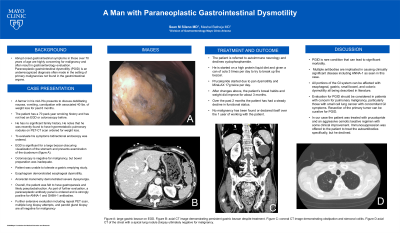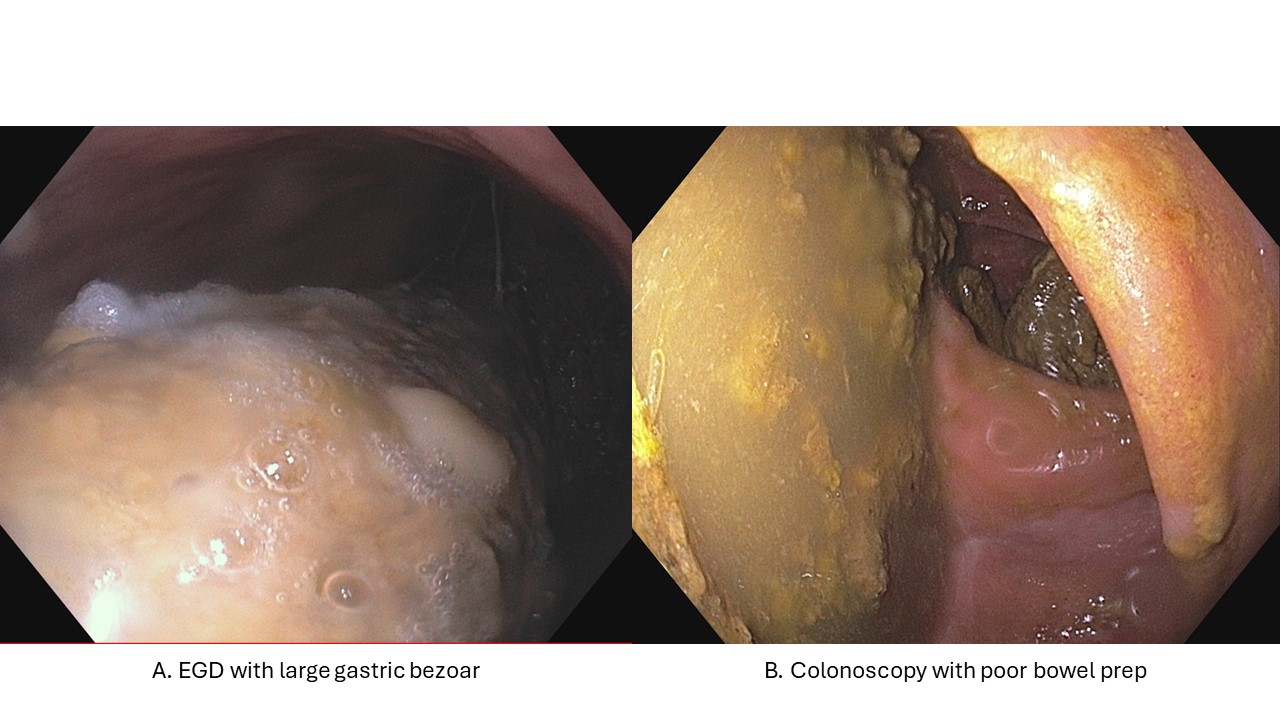Monday Poster Session
Category: Functional Bowel Disease
P2369 - A Man With Paraneoplastic Gastrointestinal Dysmotility
Monday, October 28, 2024
10:30 AM - 4:00 PM ET
Location: Exhibit Hall E

Has Audio
- SS
Sean Sileno, MD
Mayo Clinic
Phoenix, AZ
Presenting Author(s)
Sean Sileno, MD, Mashal Batheja, MD
Mayo Clinic, Phoenix, AZ
Introduction: Abrupt onset gastrointestinal symptoms in those over 70 years of age are highly concerning for malignancy and often result in gastroenterology evaluation. Paraneoplastic gastrointestinal dysmotility (PGID) is an underrecognized diagnosis most often seen in the setting of unexplained gastrointestinal symptoms in patients with small cell lung cancer.
Case Description/Methods: A farmer from the countryside in his mid-70s comes to the office to discuss debilitating symptoms of nausea, vomiting, and constipation for the past 6 months. These symptoms started suddenly and are associated with 40 pounds of weight loss from early satiety. The patient has a 70 pack-year smoking history and has not had an esophagogastroduodenoscopy (EGD) or colonoscopy before. He has no significant family history. He was also recently found to have hypermetabolic pulmonary nodules on positron emission tomography-computed tomography scan ordered for weight loss.<br><br>To evaluate his symptoms, EGD and colonoscopy were ordered. The EGD is significant for a large gastric bezoar obscuring visualization of the stomach and prevents examination of the duodenum. The colonoscopy is significant for 3 tubular adenomas that are 9-12 mm in size and inadequate bowel preparation. Due to poor visualization, both procedures are reattempted 3 weeks later with aggressive laxative regimen and with an extended bowel preparation, but the result is the same. Overall, the patient was felt to have gastroparesis and likely pseudoobstruction from an unknown dysmotility syndrome. As part of further evaluation, a paraneoplastic antibody panel is ordered, which is strongly positive for ANNA-1 and GABA-1 antibodies. Whole bowel scintigraphy is considered but ultimately cancelled due to the patient's functional status. Lung biopsy is negative for malignancy.
Discussion: PGID is rare condition that can lead to significant morbidity with multiple antibodies implicated in causing clinically significant disease including ANNA-1 as seen in this case. 80% of patients with ANNA-1 autoantibodies have associated gastrointestinal symptoms and dysmotility of esophagus, stomach, small bowel, and colon have been described in literature. Evaluation for PGID should be considered in patients with concern for pulmonary malignancy, particularly those with small cell lung cancer with concomitant GI symptoms. In our case the patient was treated with prucalopride and an aggressive osmotic laxative regimen with some clinical improvement. Immunosuppression was offered to the patient to treat the autoantibodies specifically, but he declined.

Disclosures:
Sean Sileno, MD, Mashal Batheja, MD. P2369 - A Man With Paraneoplastic Gastrointestinal Dysmotility, ACG 2024 Annual Scientific Meeting Abstracts. Philadelphia, PA: American College of Gastroenterology.
Mayo Clinic, Phoenix, AZ
Introduction: Abrupt onset gastrointestinal symptoms in those over 70 years of age are highly concerning for malignancy and often result in gastroenterology evaluation. Paraneoplastic gastrointestinal dysmotility (PGID) is an underrecognized diagnosis most often seen in the setting of unexplained gastrointestinal symptoms in patients with small cell lung cancer.
Case Description/Methods: A farmer from the countryside in his mid-70s comes to the office to discuss debilitating symptoms of nausea, vomiting, and constipation for the past 6 months. These symptoms started suddenly and are associated with 40 pounds of weight loss from early satiety. The patient has a 70 pack-year smoking history and has not had an esophagogastroduodenoscopy (EGD) or colonoscopy before. He has no significant family history. He was also recently found to have hypermetabolic pulmonary nodules on positron emission tomography-computed tomography scan ordered for weight loss.<br><br>To evaluate his symptoms, EGD and colonoscopy were ordered. The EGD is significant for a large gastric bezoar obscuring visualization of the stomach and prevents examination of the duodenum. The colonoscopy is significant for 3 tubular adenomas that are 9-12 mm in size and inadequate bowel preparation. Due to poor visualization, both procedures are reattempted 3 weeks later with aggressive laxative regimen and with an extended bowel preparation, but the result is the same. Overall, the patient was felt to have gastroparesis and likely pseudoobstruction from an unknown dysmotility syndrome. As part of further evaluation, a paraneoplastic antibody panel is ordered, which is strongly positive for ANNA-1 and GABA-1 antibodies. Whole bowel scintigraphy is considered but ultimately cancelled due to the patient's functional status. Lung biopsy is negative for malignancy.
Discussion: PGID is rare condition that can lead to significant morbidity with multiple antibodies implicated in causing clinically significant disease including ANNA-1 as seen in this case. 80% of patients with ANNA-1 autoantibodies have associated gastrointestinal symptoms and dysmotility of esophagus, stomach, small bowel, and colon have been described in literature. Evaluation for PGID should be considered in patients with concern for pulmonary malignancy, particularly those with small cell lung cancer with concomitant GI symptoms. In our case the patient was treated with prucalopride and an aggressive osmotic laxative regimen with some clinical improvement. Immunosuppression was offered to the patient to treat the autoantibodies specifically, but he declined.

Figure: Figure 1. Endoscopy images
Disclosures:
Sean Sileno indicated no relevant financial relationships.
Mashal Batheja indicated no relevant financial relationships.
Sean Sileno, MD, Mashal Batheja, MD. P2369 - A Man With Paraneoplastic Gastrointestinal Dysmotility, ACG 2024 Annual Scientific Meeting Abstracts. Philadelphia, PA: American College of Gastroenterology.
